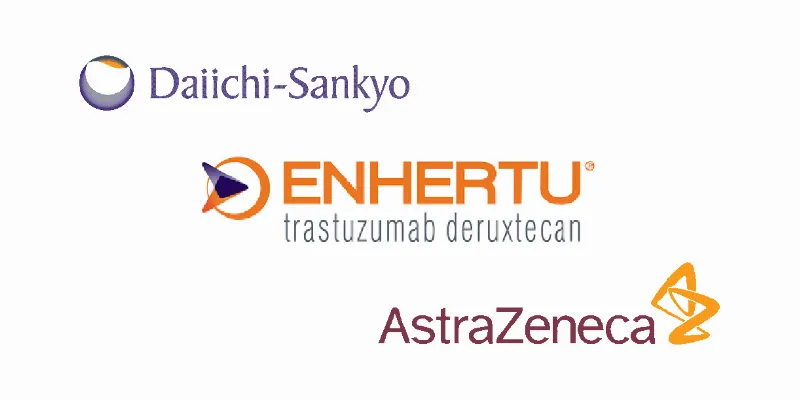EU Commission Approves Enhertu: A New Hope for Lung Cancer treatment

24 October 2023
The European Commission has approved AstraZeneca and Daiichi Sankyo's drug, Enhertu, establishing it as the first HER2-directed therapy for advanced non-small cell lung cancer patients. This approval targets adults with a specific HER2 mutation who have undergone chemotherapy.
The European Commission's approval follows the positive recommendation from the Committee for Medicinal Products for Human Use. It is based on the results of the DESTINY-Lung02 Phase II trial, which were presented at the IASLC 2023 World Conference on Lung Cancer and concurrently published in the Journal of Clinical Oncology.
This breakthrough serves as a beacon of hope for patients with advanced non-small cell lung cancer (NSCLC), which constitutes approximately 85% of all lung cancer diagnoses in Europe. Specifically, the approval of Enhertu (trastuzumab deruxtecan) targets adults with advanced NSCLC who harbour an activating HER2 mutation and have previously undergone systemic therapy following platinum-based chemotherapy, with or without immunotherapy.
The data from the DESTINY-Lung02 trial painted an encouraging picture: Enhertu showed an objective response rate of 49% and a median response duration of 16.8 months in previously-treated patients with advanced or metastatic HER2-mutant NSCLC.
Martin Reck, MD, PhD, Head of the Department of Thoracic Oncology, Lung Clinic Grosshansdorf, Germany, said:
“HER2-mutant non-small cell lung cancer is more commonly diagnosed in patients who are younger and female, and there are limited treatment options which often results in a poor prognosis. Enhertu is the first HER2-directed therapy to demonstrate strong and durable results for these patients, and this EU approval marks an important step forward in how the disease can be treated.”
Dave Fredrickson, Executive Vice President, Oncology Business Unit, AstraZeneca, said:
“Understanding the molecular drivers behind a lung cancer diagnosis is critical, and while there are now targeted options for many patients, those with HER2-mutant non-small cell lung cancer have had few treatment options, none of which have been approved to treat their specific type of lung cancer. Enhertu is the first HER2-directed option approved for HER2-mutant disease and confirms the relevance of HER2 as a target in lung cancer.”
Ken Keller, Global Head of Oncology Business, and President and CEO, Daiichi Sankyo, Inc., said:
“Since our initial approval of Enhertu for metastatic breast cancer in the EU more than two years ago, we have remained committed to bringing this innovative antibody drug conjugate to more patients with HER2-targetable tumours, especially those that have previously not been eligible for treatment with a HER2-directed therapy. With today’s news, Enhertu is the first antibody drug conjugate approved for lung cancer in the EU and is now approved in three different tumour types.”
Trastuzumab Deruxtecan in Patients With HER2-Mutant Metastatic Non–Small-Cell Lung Cancer...
PURPOSE: Trastuzumab deruxtecan (T-DXd) 5.4 and 6.4 mg/kg showed robust antitumor activity in multiple cancer indications; however, T-DXd 5.4 mg/kg has not been evaluated in patients with previously treated human epidermal growth factor receptor 2–mutant (HER2m; defined as single-nucleotide variants and exon 20 insertions) metastatic non–small-cell lung cancer (mNSCLC). METHODS: DESTINY-Lung02, a blinded, multicenter, phase II study, investigated T-DXd 5.4 mg/kg once every 3 weeks for the first time in previously treated (platinum-containing therapy) patients with HER2m mNSCLC and further assessed T-DXd 6.4 mg/kg once every 3 weeks in this population. The primary end point was confirmed objective response rate (ORR) per RECIST v1.1 by blinded independent central review. RESULTS: One hundred fifty-two patients were randomly assigned 2:1 to T-DXd 5.4 or 6.4 mg/kg once every 3 weeks. As of December 23, 2022, the median duration of follow-up was 11.5 months (range, 1.1-20.6) with 5.4 mg/kg and 11.8 months (range, 0.6-21.0) with 6.4 mg/kg. Confirmed ORR was 49.0% (95% CI, 39.0 to 59.1) and 56.0% (95% CI, 41.3 to 70.0) and median duration of response was 16.8 months (95% CI, 6.4 to not estimable [NE]) and NE (95% CI, 8.3 to NE) with 5.4 and 6.4 mg/kg, respectively. Median treatment duration was 7.7 months (range, 0.7-20.8) with 5.4 mg/kg and 8.3 months (range, 0.7-20.3) with 6.4 mg/kg. Grade ≥ 3 drug-related treatment-emergent adverse events occurred in 39 of 101 (38.6%) and 29 of 50 (58.0%) patients with 5.4 and 6.4 mg/kg, respectively. 13 of 101 (12.9%) and 14 of 50 (28.0%) patients had adjudicated drug-related interstitial lung disease (2.0% grade ≥ 3 in each arm) with 5.4 and 6.4 mg/kg, respectively. CONCLUSION: T-DXd demonstrated clinically meaningful responses at both doses. Safety profile was acceptable and generally manageable, favoring T-DXd 5.4 mg/kg.











Comments
No Comments Yet!